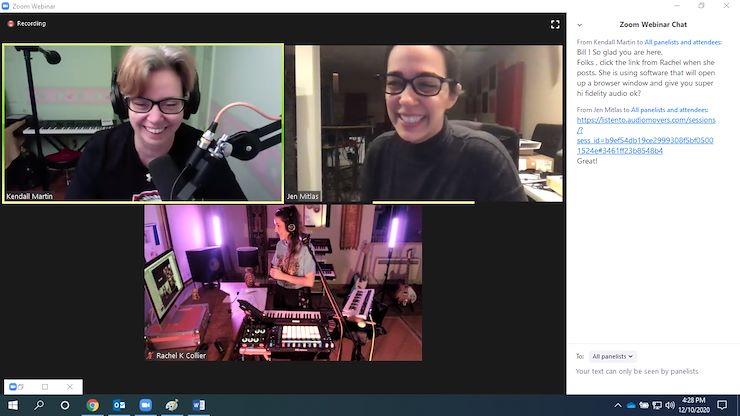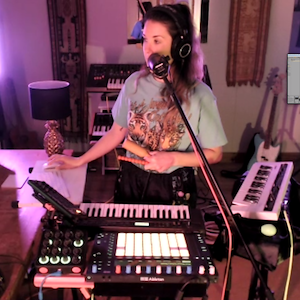
British electronic music producer and performer Rachel K. Collier was the most recent guest on "Montco@Home: Global Perspectives on Electronic Music" with Computer Science Professor Kendall Martin and Sound Recording and Music Technology Instructor Jen Mitlas.
All from the comforts of her East London studio, Rachel K. Collier recently gave one of the best live virtual music performances of the year, for an intimate audience from Montgomery County Community College watching across the pond.
The Welsh-born electronic music producer and performer led a master class in her process as an artist during a guest appearance on the Zoom virtual interview series “Montco@Home: Global Perspectives on Electronic Music” hosted by MCCC Computer Science Professor Kendall Martin and Sound Recording and Music Technology (SRT) Instructor Jen Mitlas, Thursday, Dec. 10. This was the fourth episode in the ongoing series, which began in September.
The show demonstrates for students how artistic fields, like music, are heavily integrated with technical disciplines like programming, and connects students with a diversity of views and talents that can open their minds to an array of projects possible and the range of talented people producing works of art. Martin and Mitlas recently were awarded an MCCC 2020-2021 Year of Learning Innovation Grant for the efforts.
 Collier, 31, performed her original work, including the pop song “Paper Tiger,” as a one-woman band, using a technical set up that included the digital audio workstation,
Ableton, along with synthesizers and microphone. Growing up with a more traditional singer/songwriter
musical background, that included “tinkering” on the keyboard, Collier said her experience
with Ableton has provided a freedom for her as a solo artist and performer.
Collier, 31, performed her original work, including the pop song “Paper Tiger,” as a one-woman band, using a technical set up that included the digital audio workstation,
Ableton, along with synthesizers and microphone. Growing up with a more traditional singer/songwriter
musical background, that included “tinkering” on the keyboard, Collier said her experience
with Ableton has provided a freedom for her as a solo artist and performer.
“I was in a band in college and I’d need a bass player, or a piano player, a singer, effects pedals, things like that, in order to perform,” she said. “It was frustrating that I could never play all the parts of the music I created and had to rely on other people. Working with Ableton, it was life-changing. It enabled me to take my songs that I’d written and created and arranged and go on stage and perform myself.”
MCCC students have access to all of the equipment Collier uses during her performances through the computer science and SRT program. In fact, Martin and Mitlas recently launched a new course at the College called “The Language of Digital Media,” which teaches students to use these state-of-the-art tools in digital audio and video production.
While Ableton has helped Collier tremendously as a producer, she’s still had to learn how to put on a good show for live audiences. Collier remembered when she first began performing on her own, “I was in my own zone” and quickly realized she had to make the show more attractive to people there to see her in person, she said.
Equally important, she said, was finding a balance between overloading on technology and risking malfunctioning equipment during a show.
“I learned there has to be a compromise. You have to balance the cool, techy stuff and the stuff that won’t blow up your computer. Ableton Live Push 2 controls everything. It starts loops, clips, clip track, etc. The fewer things you give your computer to do, the more chance you’ll have of having a great show.”
Collier then walked her audience through how she writes a song, starting with looped basic percussion, such as a finger snap, all the way to adding vocals and keyboard arrangements. From there, she gave about a 10-15 minute performance that was improvised at times and at other points pre-programmed in her computer.
After the show, Collier was asked to define success, and she lamented the pressure artists feel to reach a point where their music is being downloaded by the millions on social media.
“When you’re a new musician you think ‘cool, I’ll get 10 million streams.’ That’s not reality,” she said. “That’s really hard in the world we’re in now. We’re all on social media. You’re up against everybody with record deals, who’ve pumped millions of pounds and that’s why they get 10 million streams. After I released my album, I felt a bit like I didn’t get the 10 million streams. I thought I failed. Then I was like ‘hang on a minute, what’s going on here? I’m judging myself on numbers I cannot control.’”
Collier realized she was most happy just playing and making music and letting go of her anxiety.
“Basically, I retrained my brain to feel success every day I get to make music,” she said. “What everybody wants to do is build an audience – whether you sign a deal or not, it’s still the end goal. Success for me is really trying to be grateful for every day I get to play. Letting go of the pressure on myself. I’ve had a really nice time. You treat yourself a little bit nicer as well.”
When asked if the COVID-19 pandemic had influenced whether she would perform headlining shows virtually in the future, Collier expressed she had mixed emotions about it.
“You feel like you’re alone,” she said. “I think it’s awesome that it’s 10 p.m. on the east coast of England (and you’re in Philadelphia) but it’s also quite scary.”
Martin lastly asked Collier about her feelings on giving away her process for creating songs for free. Collier said creating music gives her incredible joy, and if she can give that sense to someone else by teaching them the tricks of the trade, so be it. At the same time, “there must be some things I don’t share everywhere. It’s finding a balance really.”
“The world would be a better place if everyone had a bit of fun creating,” she said. “I get off on the fact people watch what I do and get inspired to do it themselves.”
